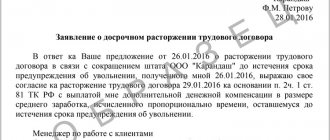Every year in Russia a very large number of people are sentenced to imprisonment, and the presence of the institution of parole in the criminal legal system is intended to interest convicts in demonstrating loyalty to the regime. The basis of criminal early release is the admissibility of correction of the sentence in matters of the type and amount of punishment, depending on the behavior of the convicted person in the conditions of serving the sentence. The reason for considering parole is the corresponding petition of the convicted person, who can exercise his right to do so within the framework of the current legislation. The issue of parole is resolved by the district court at the place where the convicted person is serving his sentence, regardless of the jurisdiction of the criminal case, as part of a special commission. Parole may look like:
- full - provided when the convicted person is serving only the main sentence;
- incomplete - parole can be applied to the main term, and the additional convict continues to serve in prison.
The court may grant one of the following types of parole:
- replace one punishment with another, milder one;
- assign a probationary period that has the same duration as the real one.
In addition, when a convicted person is released on parole, the court may assign additional responsibilities to him that coincide with the responsibilities of those serving a suspended sentence, this could be compliance with the regime, a ban on changing his place of residence without timely notification, etc. Parole can be used only in relation to those convicted persons whose correction can be carried out without serving the full sentence. Consequently, the serving by a convicted person of part of the sentence provided by law is not yet an unconditional basis for the use of parole.
Grounds for parole
Parole is associated with two inseparable circumstances:
- Achieving punishment goals.
Although the principle of the criminal system requires that the punishment imposed by the court be the minimum sufficient to reform the convicted person, in reality it is very difficult to accurately predict its impact on a particular convicted person. The court, when passing a sentence, takes into account as fully as possible all objective factors directly related to the personality of the criminal and the act committed, however, this is not a guarantee of the correct choice of the optimal punishment for its corrective effect in each case. In addition, one cannot fail to take into account that the personality of the convicted person undoubtedly changes during the execution of the sentence, and often the changes are of a positive nature, and, consequently, the achievement of the goal of the punishment often occurs before the full serving of the sentence. There are certain circumstances that are taken into account when applying the parole system, these are:
- in order for the convicted person to reform, often only part of serving the sentence is enough, and the offender must prove this by his behavior;
- the term of the part of the sentence that the convicted person must serve is established by the state and is based on the severity of the crime committed;
- the presence of a positive characteristic of the penitentiary service;
- a serious illness in a convict, which cannot be eliminated within the walls of the prison infirmary;
- presence of disability of 1st group;
- a serious mental disorder in a convicted person, which does not give him the opportunity to serve his sentence in prison and requires the immediate intervention of medical workers.
- The convict serves a certain part of the assigned sentence.
In order for a convicted person to be released from prison early, he must serve some part of the sentence established by law. The legislator determines the following terms of parole:
- one third of the sentence served - for crimes of light and medium gravity;
- not less than half of the sentence served - for serious crimes;
- two-thirds of the served sentence imposed by a court verdict - for especially serious crimes (the same rule applies if the previous parole was cancelled);
- 3/4 of the sentence served - for rape of a minor, for crimes of a terrorist nature and in the field of drug trafficking, 4/5 if violent actions were used against children under 14 years of age.
Important! An application for parole can be submitted no earlier than six months after the start of serving the sentence. Moreover, if a person is sentenced to life imprisonment, then he can be released on parole no earlier than after 25 years.
Some people believe that documents for parole are submitted automatically by the administration of the correctional institution when the mandatory part of serving the sentence begins, but this is far from the case. The convicted person must contact the colony management himself and ask them to prepare the necessary documents for sending to the court. They are obliged to consider this appeal of the convicted person in a short time and no later than 10 days after the appeal, send the documents to the court.
The court's decision
Based on the results of consideration of the petition, the court may release the convicted person from the remaining sentence or refuse to satisfy his request.
In the first case, the convicted person is subject to release while maintaining supervision over him by the penal authorities. Control continues until the criminal record is expunged or expunged.
A criminal record is expunged after the expiration of the terms specified in Article 86 of the Criminal Code of the Russian Federation: from 6 months after punishment not related to imprisonment to 10 years after punishment for especially serious crimes. We will tell you more in a separate article https://lexconsult.online/9100-ustanovlennye-zakonom-sroki-pogasheniya-snyatiya-sudimosti
If the convicted person is released early, the terms may be calculated differently depending on the type of parole:
- With full parole, when a person is released from the main and additional punishment, the criminal record begins to be expunged immediately after leaving the colony.
- With partial parole, when the additional punishment remains, the criminal record will begin to expire only after it has been served.
The court may remove the criminal record from a person released on parole immediately upon application of parole or after some time. This is possible if a person has proven by his behavior his desire for a respectable lifestyle.
Legal regulation in the procedure for obtaining parole
The procedure and grounds for parole are regulated by the provisions of Article 79 of the Criminal Code of the Russian Federation, which describes the actions of correctional institution employees if it is necessary to submit an application. As already written above, in order to be granted parole, the convicted person must contact the administration of the correctional institution; the petition can be submitted directly to the court at the location of the convicted person through a lawyer or through the administration of the correctional institution. Documents that must be present when applying for parole:
- an application from a convicted person for parole, which should list the main arguments in favor of the convicted person - evidence of his repentance, confirmation of full or partial compensation for damage, etc.;
- characteristics prepared by the administration of the PS;
- a copy of the court verdict, if guilt was not recognized by the convicted person when the sentence was passed, when submitting an application for parole, an application for its recognition should be drawn up;
- conclusion on the state of health, if the convicted person has a disease;
- writ of execution, if there is damage reflected in the court verdict;
- a statement from relatives and family members who can vouch for the convicted person (if desired);
- certificate of permanent registration at the place of residence;
- a certificate stating that the convicted person will be employed after release;
- Additionally, you can provide documents about the presence of minor children or pregnancy, difficult financial situation, and more.
How to apply for parole
Additional information
The petition can be drawn up either by the criminal himself or by his lawyer. Parents can submit an application for convicted minors.
Every convicted person who wishes to be released from punishment ahead of schedule must write a corresponding application. A sample application for parole from a convicted person is not established by law, but it should reflect all the points that prove the person’s correction.
The petition is addressed to the same court that pronounced the sentence against the convicted person. It is submitted through the administration of the colony, which sends it to the addressee within 10 days. The following must be attached to the application:
- a copy of the court verdict (officially certified by the court);
- characteristics from the place of serving the sentence;
- payment and other documents confirming compensation for material damage (if it was caused by a crime).
If these documents are not available, the petition must ask the court to make an appropriate request to obtain them. Other documents are attached upon request.
After receiving the petition, the judge requests the criminal case from the archive and studies it together with the received documents.
Please note that exemption from criminal punishment does not mean exemption from criminal liability. However, for some reasons, a citizen can absolve himself of responsibility in a criminal case. This happens in case of amnesty, expiration of statute of limitations, and so on. Read more in this article https://lexconsult.online/8615-varianty-osvobozhdeniya-ot-ugolovnoi-otvetstvennosti
Peculiarities of consideration of an application for parole
When considering an application for parole, the court must necessarily take into account the behavior of the convicted person at the moment, namely: his attitude to work, study and the crime committed. Much attention is paid to whether he compensated for at least part of the damage he caused, whether he made amends to the victim. All this data must be contained in the conclusion of the administration of the correctional institution.
Important! The case is considered at the place of actual residence of the convicted person, that is, if during the period of filing the petition he was transferred to another institution, the materials must be transferred to the body where the case will be considered and a decision will be made.
The court, when considering a request for parole, must take into account whether the convicted person has a place of residence or any connections with relatives; his behavior after release may depend on this. When making a decision, the court cannot make an unreasonable decision, including refusing to release; all conclusions must be based on the documents presented, facts, characteristics and research into the personality of the convicted person. The court has the right to return documents without making a decision only when they are not correctly drawn up; in other cases, the judicial authorities do not have the right not to accept the petition. A copy of the resolution on the court decision must be sent to the administration of the correctional institution and to the authorities involved in the execution of the punishment.
Responsibilities of a convicted person after release on parole
Regardless of the type of crime, parole can be applied, subject to compliance with the deadlines established by law, to all convicted persons. However, after release, they are subject to certain requirements that must be strictly fulfilled:
- a person released on parole must not change his place of residence, work or study without notifying the supervisory authority in writing;
- a person released on parole has no right to visit gambling establishments, night bars and restaurants; if he is seen there, he will be required to give a written explanation of his action (the inspector has the right to take testimony from witnesses in this regard);
- Parole may be revoked if the convicted person does not fulfill his obligations regarding payment of damages to the victim;
- a person released on parole must not use psychotropic and narcotic substances, otherwise compulsory treatment will be applied;
- a person released on parole should not communicate with accomplices in a crime or other persons with a criminal past.
All of these obligations can be canceled by the court, and new requirements can be added depending on the identity of the convicted person and the type of crime committed by him. Control over the fulfillment of requirements after the release of a convicted person falls on a special authorized body.
The essence of the concept
Conditional early release (PAROL) is the gaining of freedom by a convicted person before the end of his term by a court decision due to good cause. This type of release involves the assignment of a correctional period. A specialist is assigned to the offender who will monitor his compliance with the requirements established by government agencies.
| If the conditions are violated, the punishment is renewed. At the same time, it is almost impossible to get the opportunity to leave prison early again. |
When a parole order can be revoked
The legislation establishes certain requirements for a person released after release on parole; violation of these requirements may lead to the cancellation of the court order, and, consequently, to the resumption of the sentence of imprisonment until the end of the entire term. In addition, if the released person commits a new crime while on parole, the term of the new sentence will be increased - the parole will be canceled and a new term will be added to it for the new offense.
Important! If the new crime was committed due to negligence, the court has the right to decide whether there is a need to revoke parole or whether it is possible to get by with a more lenient punishment provided for by law.
Violation of the requirements of parole may also include malicious failure to comply with the conditions of release, atrocities entailing administrative liability - petty hooliganism, drinking alcohol, fights, etc., as well as lack of response to the comments of the supervising inspector.
Peculiarities of using parole for juvenile offenders
According to statistics, in our country there are a lot of people who commit crimes under the age of 18, while the criminal liability of minors is somewhat different from the general rules. However, teenagers sentenced to imprisonment by the court also have the opportunity to apply for parole. The procedure for the parole of convicted minors follows general rules, but there are several exceptions regarding the time frame. Thus, the statute of limitations for committing a crime and the time of the unserved part of the sentence are reduced by exactly half. For example, if a minor offender has committed an act of minor or moderate gravity, he no longer poses a danger to society, has served the necessary part of his sentence and has completely repented of his crime, then after being released on parole, control over him will remain only for one year, and if we are talking about serious or especially serious crimes, then the remaining part of the sentence to serve is at least three years, regardless of what sentence the court passed. In addition, there are special grounds for persons under 18 years of age, these are:
- Exemption from criminal liability - applies if a teenager has committed a crime of minor or moderate gravity and can correct himself without punishment in the form of imprisonment. In this case, compulsory educational measures may be applied to him.
- Conditional early release from serving a sentence is applied if a teenager has committed a serious or especially serious crime. At the same time, a minor offender may be sent to a specialized closed institution that has an educational program and is under the jurisdiction of the penitentiary service.
- Early release from conditional punishment - if a teenager is sentenced to forced labor and restriction of freedom, he has not committed malicious violations of the order established by the executive body during the execution of the sentence, then he deserves parole.
A feature of the parole procedure for minors is that a teenager cannot be considered a repeat offender, even if he committed a new crime before the end of the previous one; the severity of the offense is also not taken into account.
Feeding algorithm
First, you need to decide who will apply for parole - the prisoner himself or his legal representative. Undoubtedly, a person from the field of jurisprudence is in an advantageous position in this matter, since he will be able to competently draw up a plan of action and increase the chances of gaining an advantage.
Action plan:
- — make an official request;
- - submit it to the administrative department of the authority;
- — the manager prepares documentation (no more than 10 days);
- the case is sent to court.
- — within 14 days, the judge reviews the case materials and approves the date of the court hearing. In accordance with the legislation of the Russian Federation, the consideration of such cases should take no more than 30 days.
When, after submitting an application for parole, the prisoner receives a positive decision on the application, he is released. When he is released, he will remain on probation. During this period it is prohibited:
- — violate the law, including administrative offenses;
- - neglect the regulations of Article 79, paragraph 2 of the Criminal Code of the Russian Federation on parole and the responsibilities of the convicted person during the unserved part of the sentence;
- - parasitism (a certificate from the place of employment is sent to the police department).
The public order authority must be aware of all movements of the person released on parole.
To sum it up: some tips on parole
Without a doubt, those convicted should know their rights, and if a person sincerely repented of his offense, admitted his guilt and atoned for it, he has the right to be released from prison at an earlier date than provided for by the court verdict. For timely application of parole, it is recommended:
- purposefully take the path of correction from the first days of being in prison - exemplary behavior, high performance in work or study, compensation for damage, admission of guilt, reconciliation with the victim, etc.;
- collect the necessary documents in advance so that you can start processing parole immediately after serving the minimum sentence established by Russian legislation;
- even after being released on parole, it is necessary to comply with certain requirements for early release, which means leading an appropriate lifestyle - finding a job, not abusing alcohol, and strictly following the rules established by the supervisory authority.








